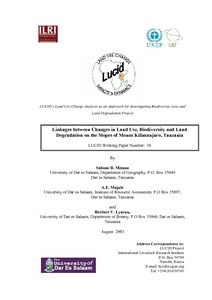Fires in Indonesia: causes, costs and policy implications
Fires are considered a potential threat to sustainable development for their direct impacts on ecosystems, their contribution to carbon emissions, and impacts on biodiversity. In 1997/98, Indonesia had the most severe fires worldwide, and smoke haze pollution recurs yearly. The fire-related policy problems are defined as smoke haze pollution, forest degradation and deforestation, and impacts on the rural sector. Some of the apparent major causes of the problems are identified. The estimate of area affected by fires in 1997/98 is revised from 9.7 million hectares to 11.7 million hectares.









